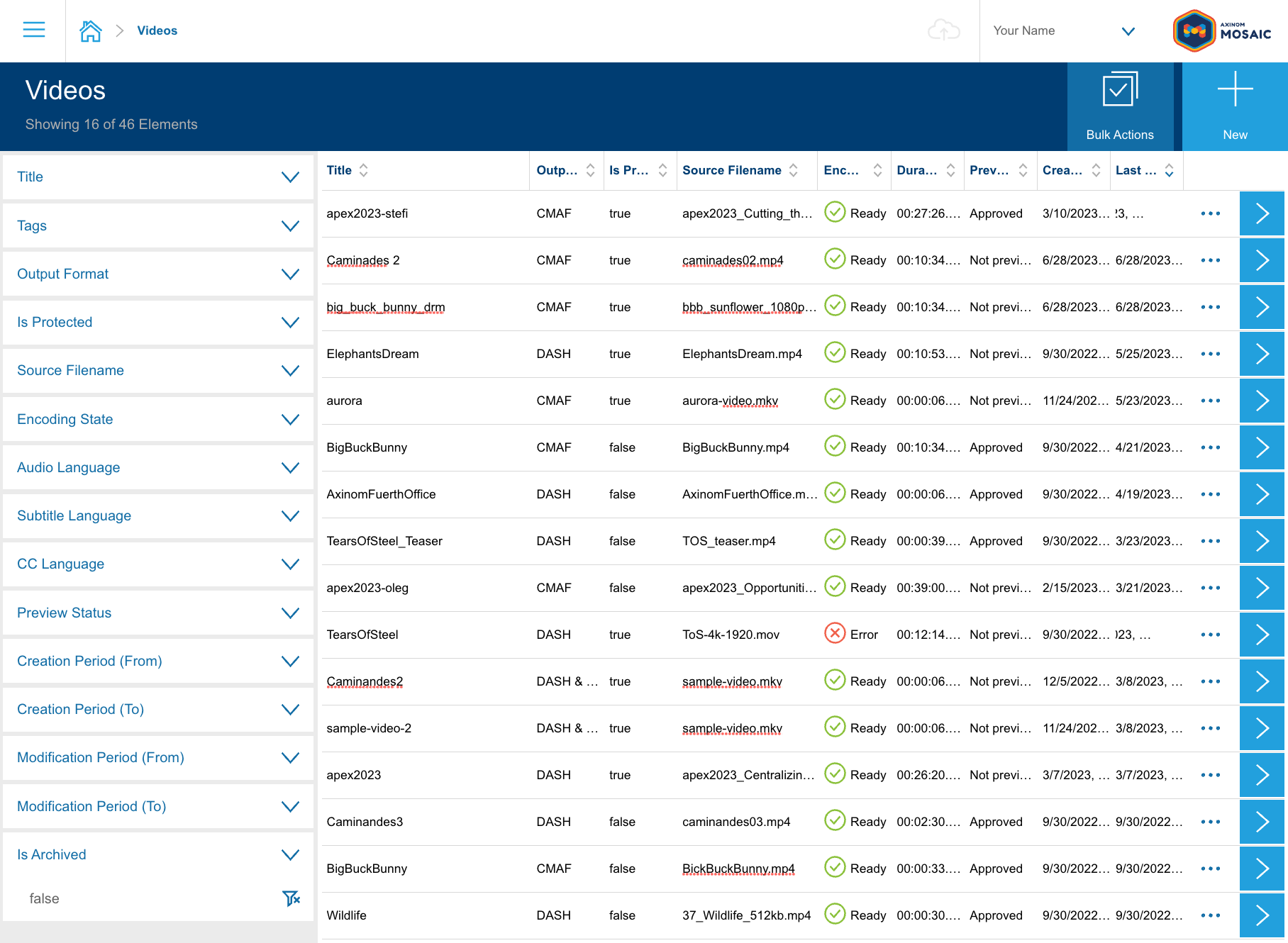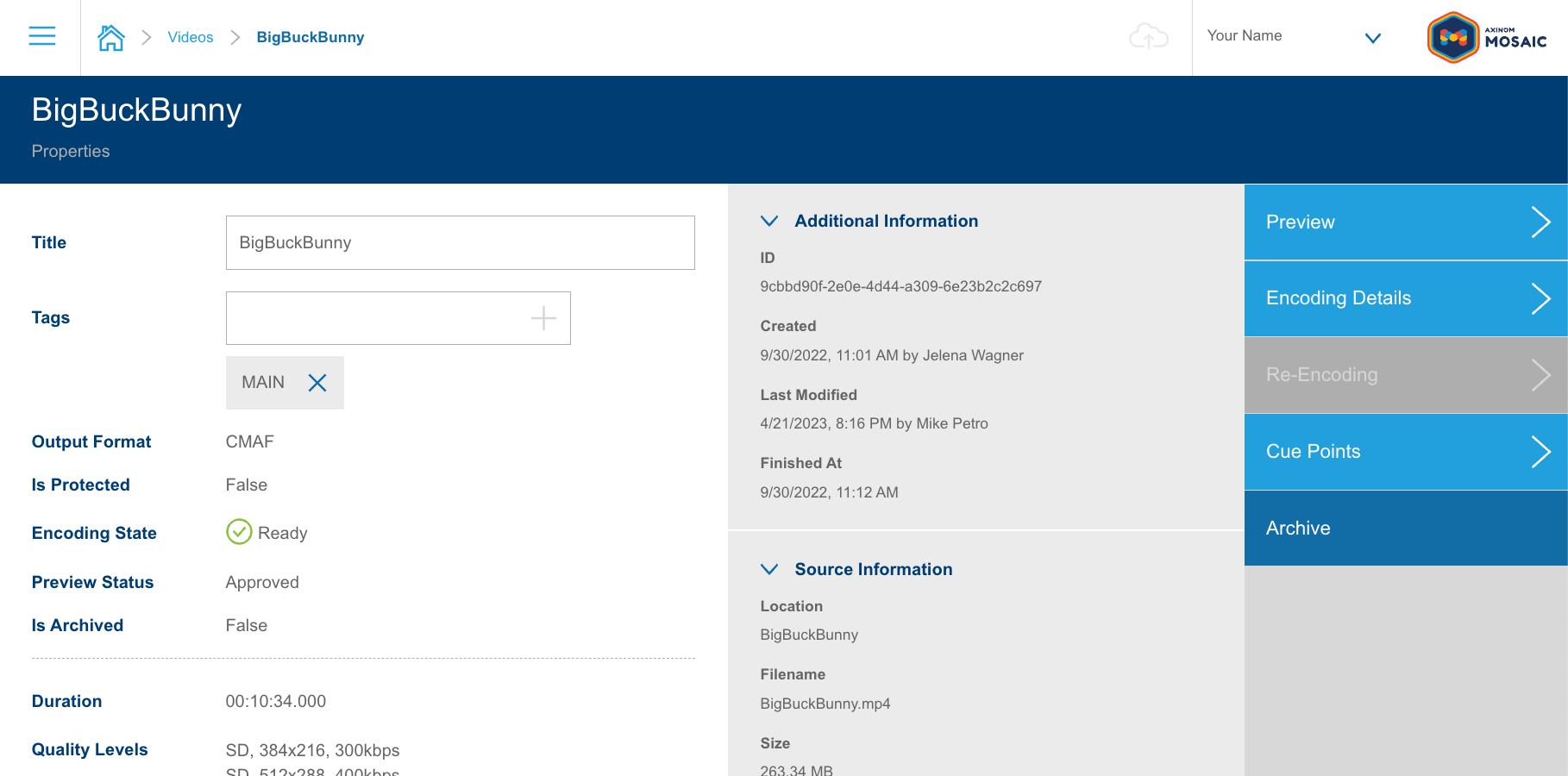Video Service
Overview
The Video Service is a Mosaic service to organize and manage your encoded videos. It allows you to easily encode new videos, register pre-encoded videos, and organize your video content. You can encode your raw video files via the Axinom Encoding Service into different formats and protect them. The Axinom Encoding Service offers various encoding options to ensure compatibility across different devices and platforms. You can also register your already encoded videos in the Video Service.
Once you have encoded your videos or registered your existing ones, you can conveniently view and manage your video library. The service provides a cue point management system for setting specific moments in your videos. It’s a unified solution that simplifies the entire video lifecycle, providing you with enhanced control over your content and its delivery.
Data Model
Interfaces
GraphQL API
This GraphQL API provides read- and management access to the data inside the Video Service.
Endpoint: https://video.service.eu.axinom.net/graphql
To use the API you need a JWT from the Identity Service (see How to authenticate a service account).
You can also use the Axinom Encoding Service API directly to encode videos and receive notification messages. In this case, the encoded videos will not show up in the Video Service though.
Messaging
The Video Service supports several commands for starting actions on the Video Service and events that you can react to. See also: Messaging.
Examples are:
- ensure video exists command: this command can be used to start the encoding of a video if it is not already encoded
- declare cue point types command: this allows your custom solutions to add new cue point types to your Video Service environment e.g. "Skip Intro".
- ensure video exists - creation started event: sent when the ensure video exists command was handled and found that the video was not yet encoded.
- ensure video exists - already existed event: like above but the video was already encoded
The above messages can be used to ingest data as part of your import process. The Ingest feature, implemented in the Media Service, allows you to encode and link a video to an ingested entity like a movie.
GUI
The Video Service comes with a microfrontend for managing and encoding videos. It plugs seamlessly into the Management System where it can be used together with the other Mosaic Services.
The video overview station lists all the videos and allows filtering and bulk operations.
Video Overview

The video detail station is the entry point for a video asset and lists the main properties. From there it is possible to manage cue points, see encoding details, ...
Video Detail

The Video Service exposes a frontend extension that any other Mosaic Service can use to select a video.
**Frontend Extension - Select Video **

Register Videos
The Video Service includes videos that have undergone an encoding process. Whether you want to encode your source videos using the Axinom Encoding process or have pre-encoded videos that you want to register, our Video Service provides the solution for you.
You can find detailed instructions on how to do this in the Encode and Register Videos guide.
Video Encoding
The Axinom Encoding Service functionality offers a way to prepare source videos for optimal streaming and playback. By leveraging your defined encoding, acquisition, and publishing profiles, you can automate the encoding process. Simply provide the source video and select the appropriate profile, and our Encoding Service will handle the rest. This allows you to offer high-quality videos to your audience without the hassle of manual encoding. The videos will show up in the Video Service along with the encoding progress information.
You can use the GraphQL mutation encodeVideo to start a video encoding process.
Video Registration
With the Video Registration feature, you can easily add already encoded videos to the system by creating custom video assets and providing the necessary details. These details include essential information about the video, such as the title and the source location. This process is particularly useful when you already have encoded videos and want to make them available for playback through our service.
You can use the GraphQL mutation createCustomVideo to register pre-encoded videos.
Configuration
Management System Settings
To enable the acquisition, processing, publishing, and DRM protection of videos, a few settings must be provided.
The settings are described on this page: Set up Encoding Profiles.
Pricing
The service fee follows the tiered model. See Mosaic Pricing for more details.